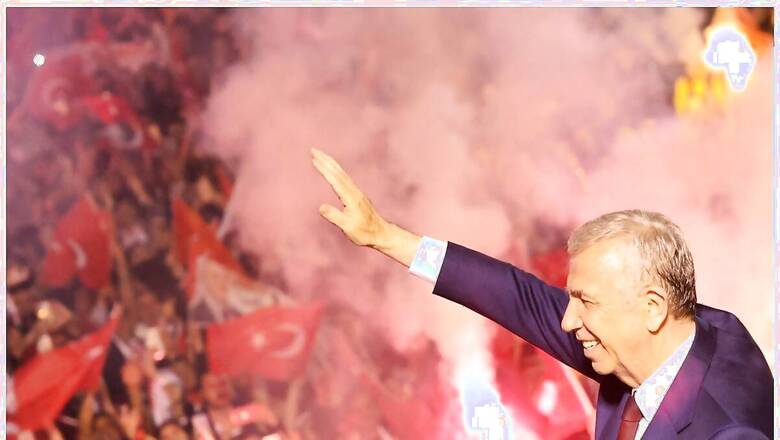
views
Turkish opposition candidates and voters were celebrating Monday, a day after President Recep Tayyip Erdogan’s party suffered a stinging defeat at municipal elections at the hands of the centre-left CHP.
“You know how it feels when the sun rises? Now it’s like a second sun has risen. We are so happy,” said Murat Akgun, 46, a small business owner in Istanbul where Erdogan had hoped to re-plant his AKP party’s flag.
With almost all ballots counted but official results not yet announced, the Republican People’s Party (CHP) defended or claimed not just major cities, but also expanded into territory in some Anatolian provinces that until now were thought to be securely in Erdogan’s hands.
It took 35 of Turkey’s 81 provincial capitals to just 24 for the president’s Justice and Development party (AKP), with pro-Kurdish party DEM taking 10 and two for Islamist party Yeniden Refah — a new appearance on the political scene that helped sap AKP support.
Top urban centres Istanbul, capital Ankara, Adana, Bursa and Antalya were among municipalities to elect CHP mayors Sunday, less than a year after the knockback of a failed presidential challenge last May.
Observers called it Erdogan’s worst election defeat since his party took power in 2002.
Many blamed inflation running at 67 percent and a crashing devaluation of the lira currency over the past year.
There are “price hikes for everything,” said Zulfiye Durtek Durmaz, a 28-year-old housewife in Istanbul, calling the government’s response “merciless” with “taxes on everything”.
“I am a mother of two children, what can we offer our children? Buy a loaf of bread, see how much it costs… we need (Erdogan) to go away,” she added.
The result “can only be explained by the economy,” wrote Abdulkadir Selvi, a commentator for pro-government paper Hurriyet seen as close to the Erdogan camp.
“A new wind has blown” through Turkey and the government now faces “a new political equation”, he added.
Turning point
Erdogan himself acknowledged a “turning point” and vowed to “respect the decision of the nation”.
His finance minister Mehmet Simsek wrote on X (formerly Twitter) that the government aimed to “permanently reduce inflation to single digits” with measures including public spending curbs and tight monetary policy.
The Turkish central bank has already increased its headline interest rate to 50 percent, from eight percent in less than a year.
Pro-government dailies Hurriyet and Yeni Safah on Monday highlighted the voters’ “message” to incumbents.
Secular nationalist daily Sozcu, which opposes Erdogan, splashed “revolution at the ballot box” across its front page, while major opposition paper Cumhuriyet hailed a “historic victory”.
Victory for the CHP may have been expected in the economic and political capitals Istanbul and Ankara, which they claimed in 2019, but observers saw the broader anti-Erdogan surge as the strongest in almost 50 years, redrawing the electoral map.
Istanbul mayor Ekrem Imamoglu, the opposition’s champion since taking the mayor’s seat in Istanbul five years ago in a hard-fought battle, now looks set for a presidential run in 2028.
Resurgence of democracy
The vote “marks the end of democratic erosion in Turkey and the resurgence of democracy,” Imamoglu told supporters overnight, saying his victory had “immense significance”.
“Imamoglu is Erdogan’s opponent in the country’s next national elections,” Soner Cagaptay of the Washington Institute posted on X, formerly Twitter.
The Istanbul mayor “has a chance to become Turkey’s president… Turkey never fails to surprise — (the) game is on,” he added.
Helping the CHP to victory was Yeniden Refah, an Islamist outfit hostile to LGBT rights, feminists, interest rates (seen as usury) but also campaigning on inflation and Turkey’s trade with Israel despite the war in Gaza.
Erdogan, who came to power as prime minister in 2003 before becoming president in 2014, said in early March that these municipal elections would be his last.
The 70-year-old leader nevertheless told dismayed supporters overnight that they “must not waste” the four years remaining before the next presidential vote.




















Comments
0 comment